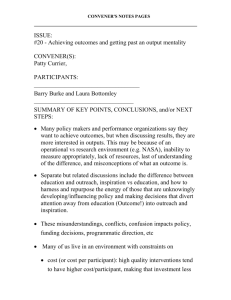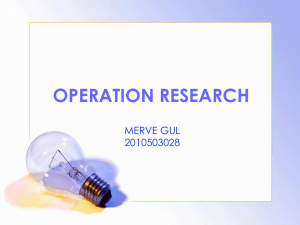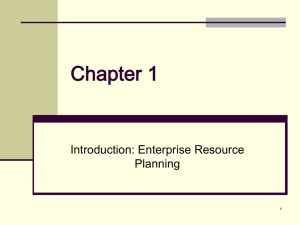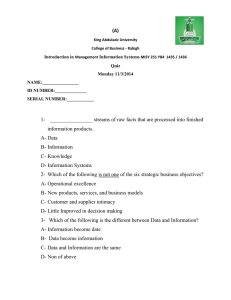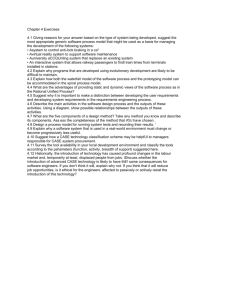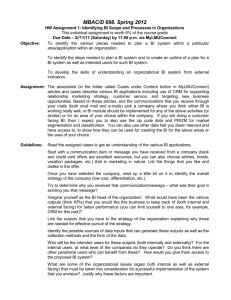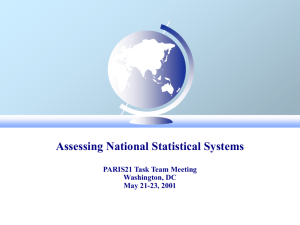Working Party on the Medium-term Plan and the Programme Budget
advertisement
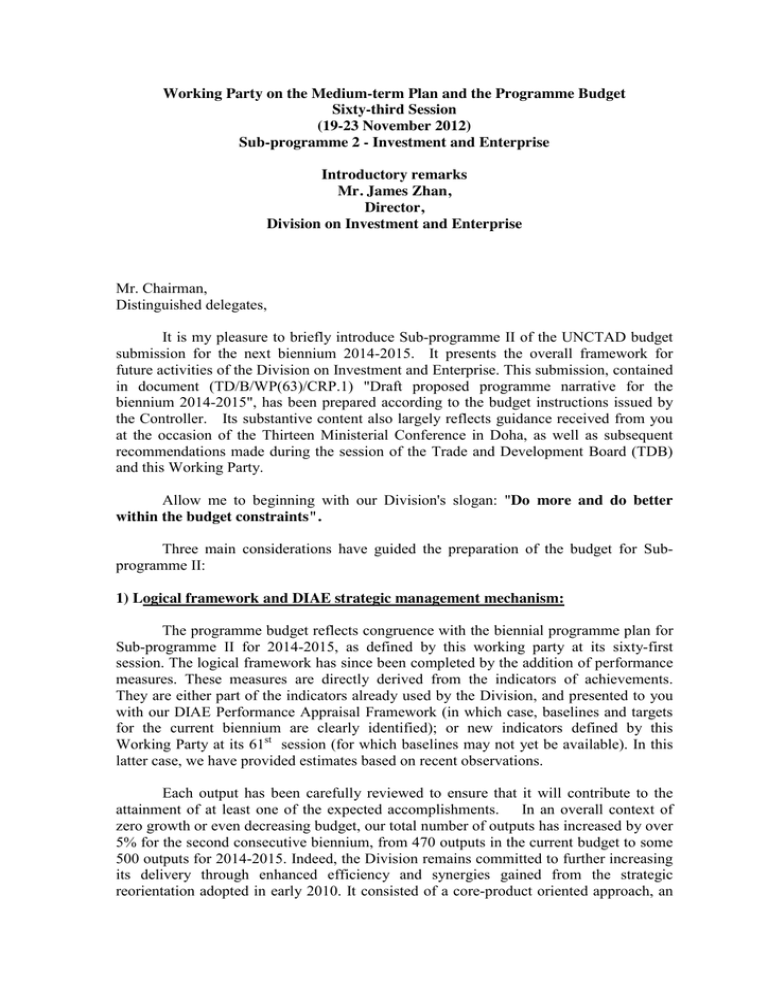
Working Party on the Medium-term Plan and the Programme Budget Sixty-third Session (19-23 November 2012) Sub-programme 2 - Investment and Enterprise Introductory remarks Mr. James Zhan, Director, Division on Investment and Enterprise Mr. Chairman, Distinguished delegates, It is my pleasure to briefly introduce Sub-programme II of the UNCTAD budget submission for the next biennium 2014-2015. It presents the overall framework for future activities of the Division on Investment and Enterprise. This submission, contained in document (TD/B/WP(63)/CRP.1) "Draft proposed programme narrative for the biennium 2014-2015", has been prepared according to the budget instructions issued by the Controller. Its substantive content also largely reflects guidance received from you at the occasion of the Thirteen Ministerial Conference in Doha, as well as subsequent recommendations made during the session of the Trade and Development Board (TDB) and this Working Party. Allow me to beginning with our Division's slogan: "Do more and do better within the budget constraints". Three main considerations have guided the preparation of the budget for Subprogramme II: 1) Logical framework and DIAE strategic management mechanism: The programme budget reflects congruence with the biennial programme plan for Sub-programme II for 2014-2015, as defined by this working party at its sixty-first session. The logical framework has since been completed by the addition of performance measures. These measures are directly derived from the indicators of achievements. They are either part of the indicators already used by the Division, and presented to you with our DIAE Performance Appraisal Framework (in which case, baselines and targets for the current biennium are clearly identified); or new indicators defined by this Working Party at its 61st session (for which baselines may not yet be available). In this latter case, we have provided estimates based on recent observations. Each output has been carefully reviewed to ensure that it will contribute to the attainment of at least one of the expected accomplishments. In an overall context of zero growth or even decreasing budget, our total number of outputs has increased by over 5% for the second consecutive biennium, from 470 outputs in the current budget to some 500 outputs for 2014-2015. Indeed, the Division remains committed to further increasing its delivery through enhanced efficiency and synergies gained from the strategic reorientation adopted in early 2010. It consisted of a core-product oriented approach, an enhanced IT approach and a networking/partnership approach. This led to the development of electronic monitors, such as the Global Investment Monitors, newsletters such as the newly launched SPN and capacity-building activities delivered at the request of member states and responding to demands arising from key and emerging development challenges. At this point, allow me to briefly summarize the implementation record of Subprogramme II. In the previous biennium 2010-2011, the Division delivered 98% of the originally planned outputs. Moreover, responding to member states’ requests, the Division successfully delivered an additional 70 outputs, representing a 20% increase on the original baseline. Among the delivery of our total outputs are over 100 publications, 130 advisory services and 90 training courses and workshops. As regards the indicators of achievements for Sub-programme II, all performance measurements were above the targets set for the 2010-2011 biennium. The document A/67/77 before you, entitled "Programme performance report of the United Nations for the biennium 2010-2011", further documents these achievements. I am very pleased to inform you that the Division is also well positioned to fully meet its targets at the end of the current biennium and indeed, I will present to you next week, in the context of the Investment, Enterprise and Development Commission an advance version of our 2012 Report on Results and Impact. I wish to emphasize the fact that a set of strategic management mechanisms is instrumental in efficient and effective implementation of the Sub-programme's log frame. These mechanisms include the use of a detailed DIAE strategic work plan. The plan is regularly reviewed to coincide with the performance cycles designed by the secretariat and adopted by member states. The strategic work plan is shared with all colleagues within the secretariat to identify possible complementarities and synergies among activities in the area of investment and enterprise development. As you know, the adoption of this DIAE strategic work plan in the context of the Result Based Management approach has been praised over the last few years by various oversight bodies such as OIOS and JIU. Most importantly, this approach has been praised by the Division's clients - investment stakeholders from beneficiary countries - because of its multiplier effect in terms of impact on development. You will remember that the Division has adopted a performance appraisal framework assessing the relevance, quality, efficiency, effectiveness and impact of its core products and services. Independent evaluators have encouraged us to make further use of this performance appraisal framework as best practice for regular assessment of our services and activities. Detailed presentation of the DIAE's performance appraisal framework will be made next week at the Investment, Enterprise and Development Commission. 2) Response to the Doha Mandate: During the preparation of the proposed programme budget for 2014-2015, all outputs were - in line with the previous discussion of this group during the review of the 2012-2013 budget programme - critically scrutinized to verify their appropriateness and articulation of the mandates received in Doha. In line with established principles for Result-Based Management, allow me to illustrate how our main outputs contribute to the four expected accomplishments in the area of investment and enterprise for sustainable development. 2 Expected accomplishment a) refers to support to our member states for improving their capacity to address key and emerging issues related to investment and its interaction with Official Development Assistance, trade and regional integration, to build productive capacity and promote sustainable development. This will be achieved through research work on investment trends, issues and policies, and on the impact of investment on sustainable development, and through related capacity building and consensus building activities. Main outputs relate to two flagship activities of the Division: the World Investment Forum, (the next session will take place in 2014) and the World Investment Report. Other outputs relate to policy research and analysis on key and emerging issues in the area of FDI and development, including the preparation of a new release of our indepth publication on FDI in Least Developed Countries. These will be complemented by targeted advisory services such as the provision of assistance to Governments and regional/sub-regional groupings in strengthening their research and policy analysis with regard to the interaction of FDI with official development assistance, trade and regional integration, advisory services to developing countries on economic diversification and structural transformation, seminars and workshops on best practices in thematic areas regarding FDI, including FDI and public services. These are complemented by seminars aiming at disseminating the main conclusions of the World Investment Report. An important cluster of outputs aiming at reaching the expected accomplishment 1 also relate to our work on FDI statistics. These outputs mainly respond to the paragraphs 41(l), 56(b), 65(a),(b),(i), and (e) of the Doha mandate. Expected accomplishment b) relates to our assistance to developing countries in the design and implementation of policies and strategies to attract and benefit from investment for sustainable development. This will be achieved through the delivery of core activities and services such as the Investment Policy Review process, investment promotion and facilitation, and business facilitation. Outputs cover and exemplify existing synergies among the three pillars of our work. They include intergovernmental deliberations of IPRs, the preparation of studies such as the investment advisory series, the series on intellectual property for development, or the investment guides, and related capacity-building activities, which constitute the core of our outputs (85) under this expected accomplishment. All these outputs respond to the paragraphs 41 (o), and 65(a), (d), (g), (h) and (j) of the Doha mandate. Expected accomplishment c) refers to DIAE's work in the area of international investment policies and more specifically International Investment Agreements (IIAs) and their development dimension. This will translate into further development of the successful series on International Investment Policies for Development, and timely analysis of emerging key issues disseminated to member states through issues notes and newsflashes. To assist member states formulating and implementing IIAs in support of sustainable development, we made provision for a number of capacity building activities such as the provision, upon request, of ad hoc advisory services and of seminars and workshops on the negotiation and implementation of IIAs, and exchange of information on the effects of IIAs on development. This will be facilitated by the Investment Framework for Sustainable Development (IPFSD) and in particular the recently launched investment policy hub. To further facilitate the international sharing of experiences and best practices, the sub-programme also made provision for maintaining and strengthening its specialized databases and network of IIAs experts and negotiators. These outputs respond to paragraph 65(k) of the Doha mandate. 3 Lastly, our work on entrepreneurship policies and business linkages, on the promotion of best practices in corporate social responsibility and accounting, and the establishment of competitive and well regulated insurance markets will be geared towards enhancing the understanding and ability of beneficiary countries to boost productive capacity through enterprise development policies. Here again, the newly launched Entrepreneurship Policy Framework and Accounting Development Tool will form the new vehicles through which capacity building assistance will be implemented. Well established core products such as the Intergovernmental Group of Experts on ISAR or our new initiative on Sustainable Stock Exchanges will further facilitate the dialogue and exchange of best practices. Our work in this area responds to paragraphs 65 (a), 65(g), 65 (l), 65(m) and 56(t) of the Doha mandate. 3) Further enhancing our efficiency and effectiveness: As I already highlighted a moment ago, the Division is facing increasing demand from beneficiary countries in all three pillars of its work. We know that in a context of sustained economic uncertainties and of a paradigm shift in the area of investment policies for sustainable development, member states are expecting further support from us. We also fully realize that at times of budget restrictions, we will have to operate in a context of zero growth budget and shrinking resources. Therefore we need to increase efficiencies so as to maintain our delivery rate, quality of our outputs and sustained impact in beneficiary countries. Allow me to briefly indicate some of the measures adopted to meet these objectives. To reinforce cost-effective delivery, the Division has streamlined its publications and will further improve its outreach. For instance, to reinforce the effective dissemination of its analytical work and policy recommendations, the Division will continue developing its web-based electronic platforms such as the hub recently developed for the Investment Policy Framework for Sustainable Development. Publications such as the Global Investment Trends Monitor and the Investment Policies Monitors will also be consolidated into a Global Investment Monitor. We will also continue expanding the World Investment Network, our online interactive network of 12,000 stakeholders in the area of investment and enterprise. In the area of capacity-building, we will further reinforce our approach aiming at utilizing regional approaches to training and advisory services in close collaboration with other intergovernmental organizations, institutions, academia and NGOs. This approach has proved highly effective, since it allows both for the further exchange of best practices and experiences among the participants and for support to national requests. The Division will also combine back to back delivery of training courses and ad hoc advisory services and we will make good use of regional best practices to enhance our general technical assistance capacity-building. The division will also continue to strengthen its links with traditional partners and continue exploring possible cooperation with new entities to leverage its resources. In this regard, the World Investment Forum has proved a very successful vehicle and we will aim at further strengthening our programmes in cooperation with partner organizations and the private sector. 4 Mr. Chairman, Distinguished Delegates, Allow me to conclude my presentation by emphasizing the Division's commitment to continue ensuring the relevance, efficiency, effectiveness and impact in its programme delivery. We will also strive to maximize existing synergies through enhanced coordination within the Division, within UNCTAD and close cooperation with other organizations dealing with investment and enterprise development. We are committed to do more and do better within the current budget constraints. Thank you. 5

